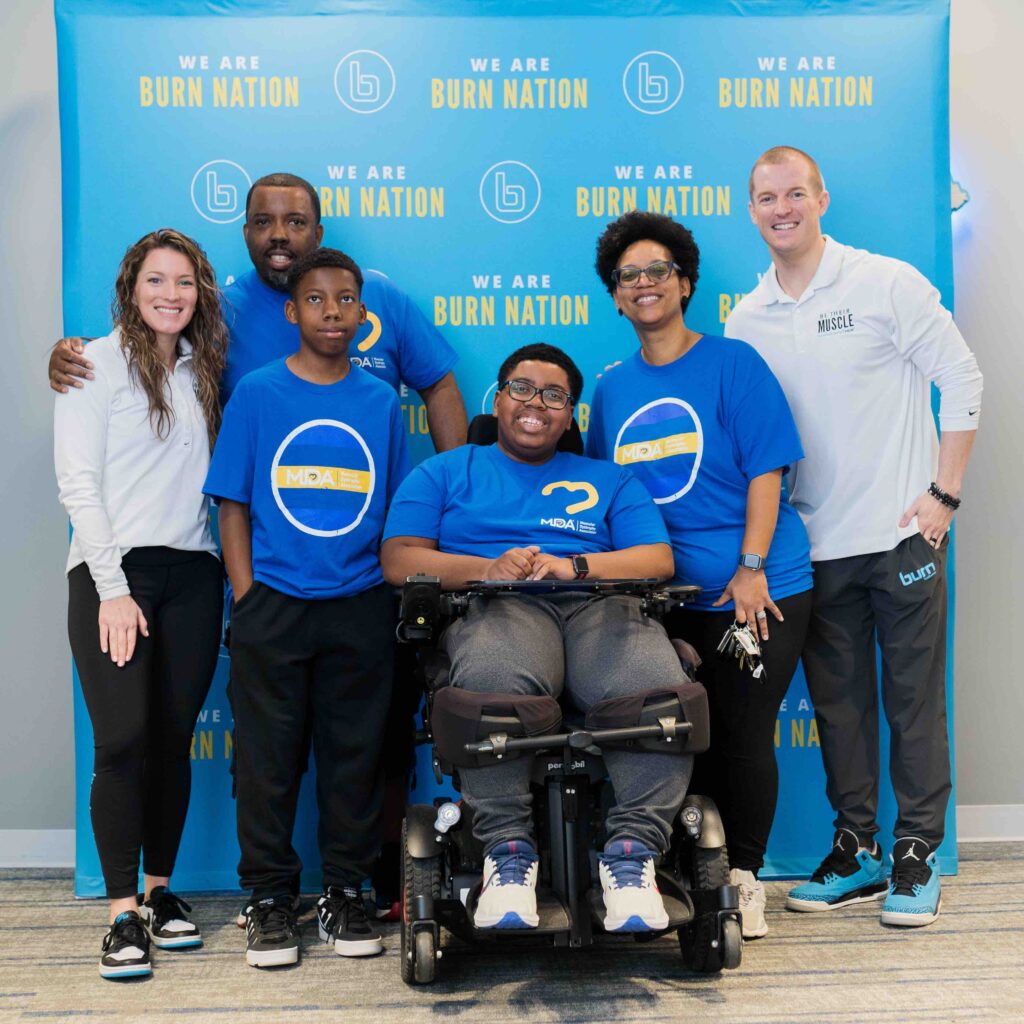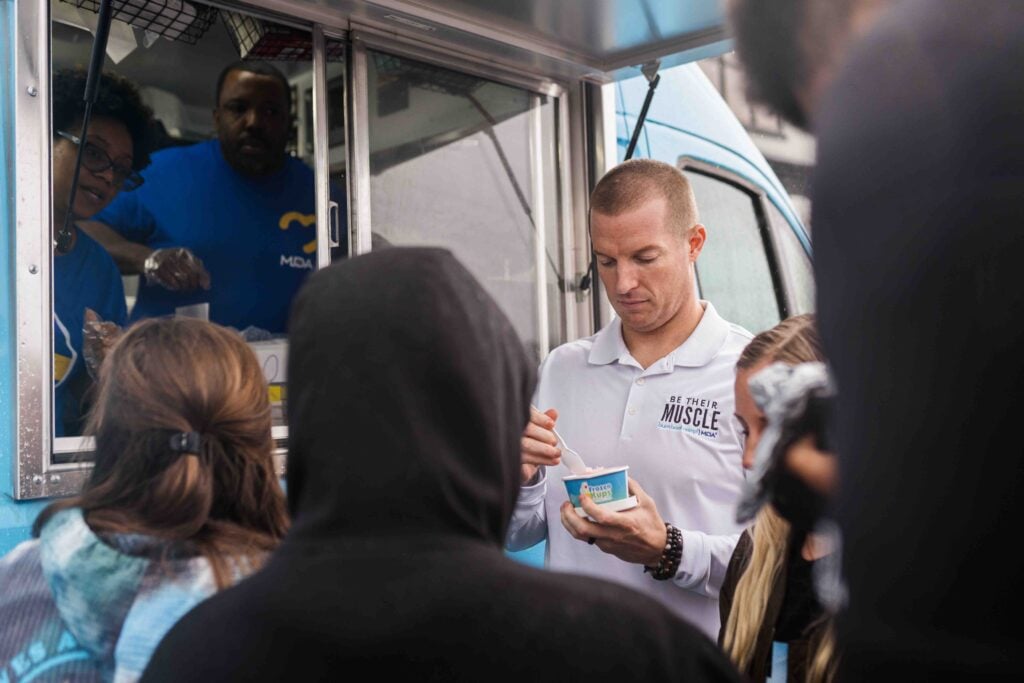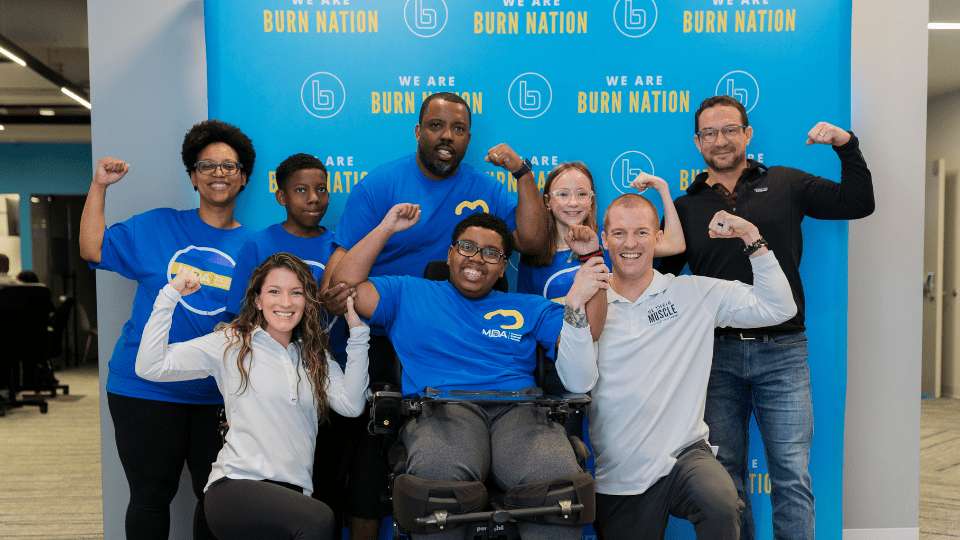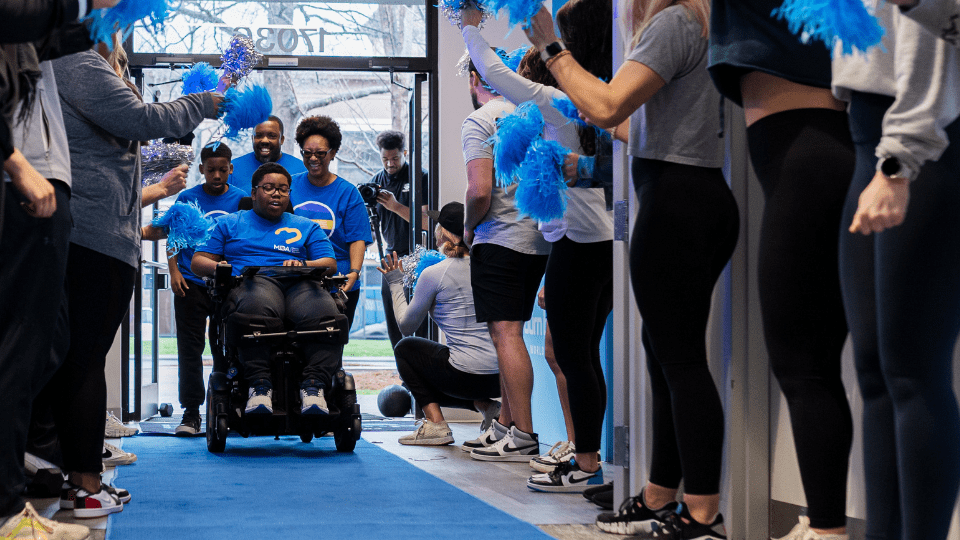Jay and Neekeesha Griffin wanted nothing more than to start a family. They prayed for a child for nearly a decade, and their prayers were finally answered when their son, Franklin, was born and filled their lives with endless joy. However, shortly after their second son, Frasier, was born, Jay and Neekeesha started to notice subtle differences between the two boys. Franklin struggled with everyday tasks that his younger brother effortlessly mastered.

Worried about their son’s health, they reached out for medical advice and Franklin underwent various tests, ultimately resulting in the diagnosis of Duchenne Muscular Dystrophy (DMD), a genetic condition without a known cure that gradually progresses. Franklin’s parents made the decision to enroll in the clinical trial for vamorolone, in which Franklin was the first person to ever take the experimental drug under the recommendation from the doctors at MDA’s Care Center at Duke University. Today, AGAMREE® (vamorolone) has been approved by the FDA, thanks in part to Franklin’s courageous participation in paving the way and to donations like yours that make this research possible.
We’re proud to partner with the Muscular Dystrophy Association (MDA) and share the inspiring and emotional stories of kids like Franklin. MDA is dedicated to helping those affected by muscular dystrophy, ALS, and related neuromuscular diseases. Over 300 Burn Boot Camp locations are uniting throughout April to raise awareness and funds in support of MDA. Every dollar raised plays a vital role in accelerating research, enhancing care, and advocating for families affected by these debilitating conditions.
Join us in supporting MDA by being part of our ‘Be Their Muscle’ Camp on Saturday, April 20th, or by donating to this important cause.
Watch this short video to get a sneak peek into Franklin’s visit at Burn Boot Camp HQ and to hear from the inspiring Griffin family.
Learn more about Franklin’s story and the impact of MDA from our interview with the Griffin Family below.

You talk a lot about your steadfast unwavering faith and bringing Franklin into the world. Talk to me a little bit about that journey.
Jay Griffin: The journey of our faith. We’ve always had a personal relationship with God, and that’s the foundation on which we go about our marriage and our life. It really started when we went to New Life Fellowship. That’s the first church we attended here, and it spoke a lot about faith. During that time, we were actively trying to have kids for ten-plus years. That took a lot of faith, prayer, hope, and trips to CVS for ovulation kits and pregnancy tests, only to find that we weren’t pregnant. But our faith was ignited one day when we decided that we were going to put a car seat in the back of our car.
That was our way of showing us every day that we believed and trusted in God that we were going to have a kid at some point, despite what medical doctors have said. A lot of people oftentimes will say, “Hey, Jay, Neekeesha, are y’all expecting a baby?” Because they see the car seat. So without lying, we say, “Yeah, we are expecting. We’re expecting a blessing any day now. We’re just waiting and trusting God.” And through that process, there’s been countless examples of God really bringing us closer to that. There were family and friends that allowed us to be godparents.
Instead of us being upset and having a pity party because everyone else is pregnant and we’re not, we allowed that to push our faith even further. So, we would go all out for those families and provide gifts and stuff. We would park inside the “expecting” parking spaces at Baby R Us. After ten years, having the D&C and losing a baby, we were finally able to get Franklin. He’s a product of what God can do when you trust him, and he’s an everyday reflection of that.
Can you talk to us about when you started to maybe notice some developmental issues with Franklin? What prompted additional doctor visits and raised concern for you?
Jay Griffin: In the beginning, you have to remember that we never had any kids before. Franklin was our first so we didn’t have a gauge as to how our son was going to develop along the way. But we noticed that he was walking a little bit later. We noticed that he was getting off the floor a little bit differently. We noticed over time that he had enlarged calves. So, I thought he was going to be able to jump out of the gym playing basketball because his calves were so large. And we noticed he couldn’t lift the chair on top of the table at preschool and kindergarten.
So, we went to our pediatrician and said, “Hey, these are the things that we’re noticing.” But they didn’t know what it was. They thought that maybe he was just developing late. We just had to continue to work with him. And so, as a dad, I was helping him do more push-ups and sit-ups, trying to get his strength up. It wasn’t until Frasier came along, when Frasier turned 1 or 2 years old, we noticed him jumping off everything, getting up off the floor fine, running, and doing all those different things. That was really the defining moment that there is something wrong beyond he’s just not developing.
We told the pediatrician that we needed to do something different, so she referred us to the neurologist. We took him to the neurologist and the neurologist saw the things that he wasn’t doing. They decided to do a CK test. The CK test basically measures if there’s any type of muscle damage. So, a normal CK result was under 500. His came back at 46,000. There was a muscle disease, but they didn’t know at the time exactly which version of the disease it was. That’s when our antennas really started to be heightened. After that, we did a DNA test which took months to get back, and it confirmed that he had Duchenne Muscular Dystrophy.
You wrote about the moment that your world changed when it was confirmed that he had Duchenne Muscular Dystrophy. You wrote explaining it’s a genetic disease that has no cure and is progressive. The moment that your world changed, can you take me to that moment?
Jay Griffin: For me, it was twofold. We went right back to the same hospital, Northeast Medical Center. But Northeast Medical Center has a positive moment for me, because when we found out that we were having a boy and everything was good, we came down the stairs and there was a white rocking chair, and we sat there in joy, knowing finally, after ten years without any medical interventions, with all the stuff that we went through, that we were going to have a son. But it was in that same building at the walkway going into the parking garage where it really hit me that we have a son who’s going to be walking through this new season.
That’s when we broke down. We were very emotional. We questioned, now after ten years of faith, here we are with the blessing, but now there’s a different chapter that we’re going to be a part of. That was really, really, tough. I think at that same time, as a husband and wife, it’s not often talked about. We speak a lot about Franklin and the kids that are walking through this disease. But there’s a part where Neekeesha and I have to navigate together because we both love our sons. We both would die for our sons.
We identified where our strengths were in relation to supporting him. Whereas I am the one that’s out front, I’m going through the fire, I’m the one that’s researching. I’m looking at this disease and all the bad stuff with it. Whereas she’s the nurturing one. She wants to make sure that he has everything he needs, and that he feels like he’s no different than Frasier or any other kid. I usually filter all the research and information to her. We have our pillow talk moments about how we’re going to support both of our boys with one walking through this disease.
Neekeesha Griffin: I think the moment that it hit me was when we went to Duke Hospital. I think it was that first visit when all the doctors rushed in. In that split second, I felt like I was in another world. I really felt like I was in a tunnel and they were like, “Mom, are you okay? Are you okay?” Because everybody was like, this doctor, that doctor. They just all came in. I was just thinking, what is about to happen? I think after that moment, after prayer and understanding that we are given these opportunities for a reason, for God to show his grace and mercy and to walk you through things. Eventually I got to the point where I’m going to be like, “Okay, Jay, you’re going to be the front runner. I need you to research, tell me the bad stuff later on, and let me just concentrate on making sure he has a loving home, making sure things are normal, making sure he’s participating in all kinds of activities that he can, and just giving him the life that is full of purpose, even though we’re walking through tough stuff.” So, that’s my job, you know, to keep it level in the house.
What was it like knowing Franklin would be the first patient in the world to try vamorolone?
Jay Griffin: As a parent, by nature, your desire is to protect your kids from all hurt, harm, and danger. That was the toughest part because there was nothing physically that I could do as a dad to make his ‘dis-ease’ go away. And I say ‘dis-ease’ because we’re all dealing with a disease, walking through something that’s not easy. His is his muscles. Yours might be depression, it might be anxiety, it might be substance abuse. But his is Duchenne. And I physically can’t make it go away. If I could, I would put myself on the table, give him the dystrophin, and let me be the one in the wheelchair. But I can’t.
So, during our first visit, Doctor Smith at Duke spoke about vamorolone. It was never tried in a human before. It was in preclinical things. The only standard of care was Prednisone and Deflazacort, two steroids. It doesn’t cure it. It just strengthens you and prolongs the progression. And we knew for a fact that Prednisone and Deflazacort had all these side effects. It stunts your growth, liver problems, bone fragility issues. It makes you irritable, all kinds of stuff. And we heard that through parents who were actually in that.
When vamorolone came along, it was never tested, only in trials. So, as a parent, you’re trying to decide between three bad options, Prednisone and Deflazacort, doing nothing, or vamorolone. And we had that conversation. If we give him Prednisone or Deflazacort, we know exactly what’s going to happen because all the parents deal with the same thing. Or we can do nothing and we know that his progression is going to go full speed ahead without proper intervention. Then, vamorolone, giving him something that they don’t know how it’s going to work, whether it’s going to kill him, whether it’s going to mess up his insides, whatever it’s going to do.
It was because of Doctor Smith and his team at Duke. The question I asked Doctor Smith was, if this was your son, what would you do? And it was the community. They had the heart to do what was right for him. We knew that we had to set a pathway for other kids so that they could participate. So, we decided that we were going to give him vamorolone. It was a day before his birthday, so we had to rush to Duke the day before his birthday, and he got injected with it.
We prayed together. Everybody was watching Franklin like a hawk. They called all the time. And fast forward, vamorolone has been approved. Now all other Duchenne boys can come off Prednisone and Deflazacort for this drug.
Why is the partnership between Burn Boot Camp and MDA important for fundraising and to help families like yourself?
Jay Griffin: I say that we all are called to serve, and we are all called to use our gifts, our time, our talent, our treasure, our influence, our status, to be a blessing to someone whom we will never meet. It’s important with Burn Boot Camp and MDA because they can use their gifts, that time, talent, treasure, and influence to help kids like Franklin and the other families dealing with muscular dystrophy. And it brings awareness. It brings research. It makes us feel like we’re not alone in this battle, that we’re walking with others in the ultimate goal of providing medicine and meaningful treatments for our kids. So it means a lot.
Talk to us about your entrepreneurial endeavor and how that’s intertwined with your journey, supporting Franklin and the entire Duchenne community.
Jay Griffin: I think Neekeesha and I always wanted to be entrepreneurs. I think we always wanted to be business owners, even before Franklin came. We were always on that path, but like I said, it was when Fraser wasn’t eating his green beans at the table and Neekeesha and I were talking about opening up an ice cream shop. We went through the process of opening it and were trying to find financing. We knew what our purpose was because God revealed himself to us in that. When we were looking for financing, Neekeesha’s job, which was in Huntersville corporate office, was going to Houston and they wanted us to move to Houston for her new job.
But I told her, we’re not moving to Texas. It’s too far. I’m not going that far, number one. Number two, Franklin’s doctors were at Duke. And three, we were looking to open Frozen Kups. And about four days after that, we got the approval from the bank that we were going to get the loan. We got a letter of intent that we can get the loan for the business and we prayed about it and then Frozen Kups opened up. But how these pieces work out is how we’re able to use Frozen Kups as a byproduct to do what we’re called to do, which is to serve. And this was a platform where we, as parents, couldn’t physically make Duchenne go away, but we can use our gifts to be able to bring forth awareness about MDA, Duchenne, and Muscular Dystrophy, and raise money and awareness. It’s all coming full circle for us, and that’s the goal.

Franklin, how do you feel about MDA and Burn Boot Camp doing all they’re doing to try to raise money?
Franklin Griffin: I really appreciate what you guys are doing. Not many people know about my disease. And you guys doing that really helps people know about it. And I appreciate that.
How can a single donation to MDA impact someone?
Neekeesha Griffin: Donations really help with research. We appreciate MDA too, because they share a lot of upcoming trials and medicines. I get those emails all the time and I’m like, “Jay, did you see this one? Did you see this one that came from MDA?” So, the money helps MDA to be able to send out money to the doctors and scientists so they can do their research. It’s very important because we’re trying to find something that allows these young boys and young girls to have a really great life and not be cut off, shortened by not enough medicine out there to keep them.
A lot of them have dreams and they have things they’re trying to accomplish, too. My son wants to be an environmental engineer, and I want him to see that. So, I appreciate everything that MDA is doing, all the money for research. I appreciate all of that because one day we want to be able to see him walk across that stage and get his diploma and his degree and say, “Mom, I’m an engineer.” So, I’m hoping that happens.
Jay Griffin: It’s not necessarily about the amount you give, it’s about the spirit in which you give. It’s you giving that amount and knowing that you’re giving it to an organization that’s rooted in good soil. Burn Boot Camp and MDA are being intentional and communicating what they’re doing, who they’re doing it for, and educating about what MDA is. What is Duchenne Muscular Dystrophy and what diseases will the money go to? When people understand what they’re doing and the heart that you’re given, that’s so much richer when you give, whether it be $5 or $500,000.
So, I’d just like to say thank you. Often, this doesn’t get talked about, but this is therapeutic for me because this is not just a physical walk, it’s an emotional, psychological walk. Especially for me to know that I have people who are strong, who are advocating and helping us to help our son. And so, the fact that you guys are really tearing down all the strongholds to be intentional about bringing forth meaningful treatment, we appreciate it.



